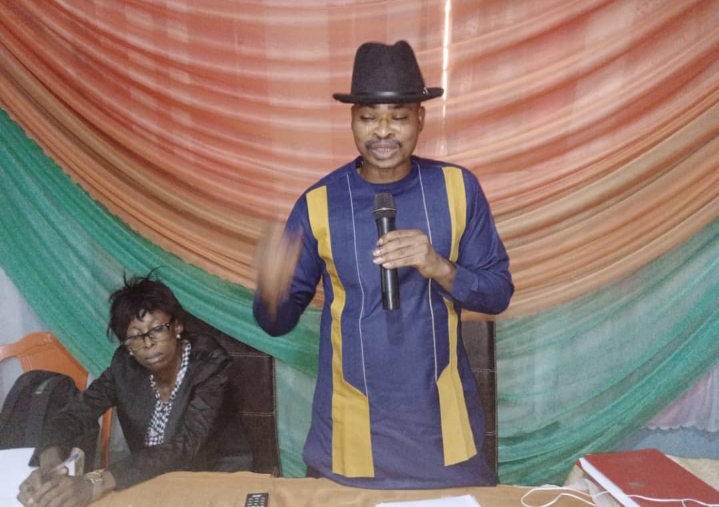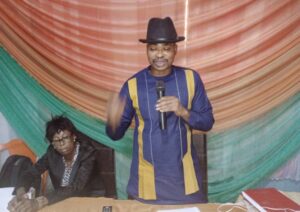Malaria Intervention: Osun ACOMIN Calls On Govt To Provide Functional Malaria Surveillance System
By Sola Aderinto,
Accountability of Civil Society on Malaria Control, Immunization and Nutrition, ACOMIN Osun state zone has called on Nigerian government should set up and implement a functional malaria surveillance system to collect data on malaria cases and monitor eradication progress.
This is as it maintained that Malaria can only be eradicated in Nigeria when the government feels committed to it as a national responsibility, adding that Malaria elimination should be seen as project that demands immediate attention.
This was the summation of Osun ACOMIN under its Chairman, Ambassador Aremu Stephen Akinyele, who made this known at the state media briefing on the Global Fund Malaria Community-Led Monitoring project being Implemented in selected local governments in the state.
According to Ambassador Aremu, Malaria hyper-endemicity is a major public health crisis that requires Nigerian government’s deliberate and consistent efforts to follow recommended strategies to eliminate and eradicate malaria, as well as save the people from deaths and malaria associated health consequences.
Reiterating that malaria remains a significant public health challenge in Nigeria, affecting millions of lives annually, he disclosed that a strategic initiative has to be applied to remove obstacles hindering malaria eradication by focusing on robust environmental management.
“Malaria eradication program in Nigeria is faced with several constraints such as poor living environmental conditions, the lack of basic sustainable infrastructures, underfunding of the health structure, limited access to healthcare, program inconsistency, and lack of oversight, political, social and economic structures of Nigeria and the inadequate efforts to educate the public, and lack of access to healthcare, mosquito bites at swampy neighborhood, plus limited and dysfunctional health facilities in some places.
While lauding ACOMIN for proactiveness, Ambassador Aremu who is also the Executive Director Hope for Family Development Initiative HFDI commended all its partners and stakeholders, adding that to combat the increasing incidence rate of malaria, urgent actions and collective effort from the public are necessary, this is why as part of the national effort to address the challenges of Malaria in Nigeria, ACOMIN was engaged by Catholic Relief Services (CRS) under the ongoing Global Fund (GF) Malaria Grant to continue implementing the civil society component, building on the successes of the previous phase of the grant.
Ambassador Aremu postulated that out of the 13 selected states, Osun state has its beneficiary local governments as Olorunda, Irepodun, Obokun, Boluwaduro, Ilesha West, Iwo, Ejigbo and Egbedore, he emphasized that the Community-Led Monitoring project being implemented by ACOMIN increased ingenuity, flexibility in tackling challenges by identifying and addressing the root cause of failed interventions; and enhanced accountability among others.
In his remarks, the State Program Officer, SPO Segun David Amoto, highlighted that for year 2023, ACOMIN Osun state recorded successes in the targeted local governments in areas of bridging the Communication, intervention on provisions of amenities such as purchase of electricity prepaid meter through ACOMIN CAT members, maintenances, purchase of herbicide to spray the facilities, surroundings of the facility, purchase of BP apparatus and weigh scale, and restock of malaria related consumables among others.
ACOMIN Osun state also did advocacy to stakeholders on improved services at the health facilities, got donation of complementary drugs such as paracetamol, Vitamin B complex and Vitamin C from community stakeholder, pack of hand Gloves and Blood Pressure Apparatus, resolved staff shortage, and security provision for the 24-hour shift at the health facilities to yield quality of service delivery.
Success recorded also includes donation of a new storex tank, water supply into the facility to relief the complain of water supply at the center, clearing bushy surroundings, renovation of some section of the facility, provision of pillow cases, increase patronage of pregnant women, and repairing of faulty borehole among others.
ACOMIN also had Call to Action collaboration with JDPMC to address the Barriers to Malaria Elimination for Nigeria to progress in the control and elimination of malaria, it asserted that combination of measures that include mosquito avoidance, improved access to diagnostics and treatment, health education and promotion and community partnership is adopted, while it called on governments, private sector and other stakeholders in malaria to commit to malaria eradication.
It pinpointed that it is time for the National Health Insurance program enjoyed by the formal sector to be extended to other citizens of Nigeria, particularly the poor and most vulnerable. It thanked Osun government for keying some vulnerables which include persons with disability into the insurance scheme, and it has that local governments vulnerables should be captured in the health scheme as well.
ACOMIN cautioned the government on funding and finances for primary health delivery, said it should be carefully mapped out, while and misappropriation or mismanagement should be avoided to enable a robust public health program at all ward levels in the local governments, adding that separate funding allocation and management for the health sector will help promote continuity, accountability, improve grassroots outreach, intervention and engagement.
The Global Fund ACOMIN partners in Osun called on the governments and society for Communication and education programs to raise knowledge and awareness, to promote community participation and adherence to evidence-based strategies, commit adequate resources through advocacy and partnerships, for the full and effective implementation of all planned interventions, have community involvement actively support and advocate for their local Primary Healthcare Centers.



